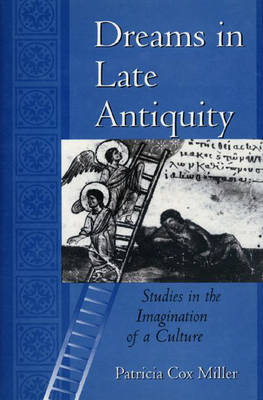
Dreams in Late Antiquity
Studies in the Imagination of a Culture
Seiten
1994
Princeton University Press (Verlag)
978-0-691-07422-1 (ISBN)
Princeton University Press (Verlag)
978-0-691-07422-1 (ISBN)
- Titel ist leider vergriffen;
keine Neuauflage - Artikel merken
Draws on pagan, Jewish and Christian sources and modern semiotic theory to demonstrate the importance of dreams in late antiquity. The text argues that Graeco-Roman dream literature formed a personal and cultural pattern of imagination and gave tangible substance to ideas such as time and the self.
Dream interpretation was a prominent feature of the intellectual and imaginative world of late antiquity, for martyrs and magicians, philosophers and theologians alike. Finding it difficult to account for the prevalence of dream-divination, modern scholarship has often condemned it as a cultural weakness, a mass lapse into mere superstition. In this book, Patricia Cox Miller draws on pagan, Jewish and Christian sources and modern semiotic theory to demonstrate the integral importance of dreams in late antiquity. She argues that Graeco-Roman dream literature functioned as a language of signs that formed a personal and cultural pattern of imagination and gave tangible substance to ideas such as time, cosmic history and the self. Miller first discusses late-antique theories of dreaming, with emphasis on theological, philosophical and hermeneutical methods of deciphering dreams as well as the practical uses of dreams, especially in magic and the cult of Asclepius. She then considers the cases of six Graeco-Roman dreamers: Hermas, Perpetua, Aelius Aristides, Jerome, Gregory of Nyssa, and Gregory of Nazianus.
Dream interpretation was a prominent feature of the intellectual and imaginative world of late antiquity, for martyrs and magicians, philosophers and theologians alike. Finding it difficult to account for the prevalence of dream-divination, modern scholarship has often condemned it as a cultural weakness, a mass lapse into mere superstition. In this book, Patricia Cox Miller draws on pagan, Jewish and Christian sources and modern semiotic theory to demonstrate the integral importance of dreams in late antiquity. She argues that Graeco-Roman dream literature functioned as a language of signs that formed a personal and cultural pattern of imagination and gave tangible substance to ideas such as time, cosmic history and the self. Miller first discusses late-antique theories of dreaming, with emphasis on theological, philosophical and hermeneutical methods of deciphering dreams as well as the practical uses of dreams, especially in magic and the cult of Asclepius. She then considers the cases of six Graeco-Roman dreamers: Hermas, Perpetua, Aelius Aristides, Jerome, Gregory of Nyssa, and Gregory of Nazianus.
Patricia Cox Miller is Associate Professor of Religion at Syracuse University. She is the author of Biography in Late Antiquity: A Quest for the Holy Man.
| Reihe/Serie | Bollingen Series |
|---|---|
| Verlagsort | New Jersey |
| Sprache | englisch |
| Maße | 152 x 229 mm |
| Gewicht | 539 g |
| Themenwelt | Geschichte ► Allgemeine Geschichte ► Vor- und Frühgeschichte |
| Geschichte ► Teilgebiete der Geschichte ► Kulturgeschichte | |
| Geisteswissenschaften ► Psychologie ► Biopsychologie / Neurowissenschaften | |
| Sozialwissenschaften | |
| ISBN-10 | 0-691-07422-4 / 0691074224 |
| ISBN-13 | 978-0-691-07422-1 / 9780691074221 |
| Zustand | Neuware |
| Haben Sie eine Frage zum Produkt? |
Mehr entdecken
aus dem Bereich
aus dem Bereich
auf den Spuren der frühen Zivilisationen
Buch | Hardcover (2023)
C.H.Beck (Verlag)
20,00 €
Konzepte – Methoden – Theorien
Buch | Softcover (2024)
UTB (Verlag)
39,90 €
Was Pompeji über uns erzählt
Buch | Hardcover (2023)
Propyläen (Verlag)
32,00 €


